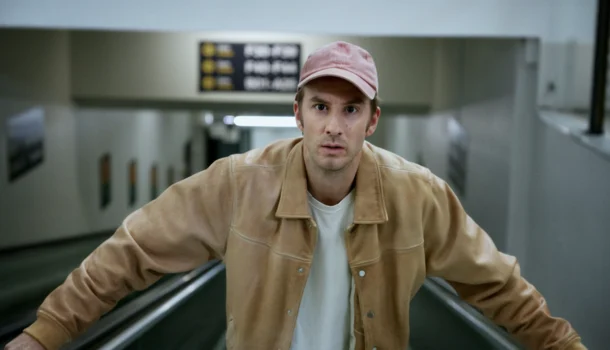Some films don’t merely sidestep conventions — they seem to sabotage them from within. “Trouble”, a Swedish remake of “Strul” (1988), does exactly that: it rejects the predictable scaffolding of the crime comedy and implodes, with subversive elegance, any expectation of easy laughter or comforting redemption. Under Jon Holmberg’s direction, absurdity isn’t decorative flair — it’s the structural logic that dismantles the viewer’s trust in institutions, causes, and consequences. Rather than depict a slightly dysfunctional world, the film forces us to inhabit a twisted logic in which error and misunderstanding are not anomalies — they are standard operating procedure.
Conny, the protagonist, embodies the banality of modern collapse: an electronics technician, emotionally stalled in the aftermath of a divorce, who is ensnared not by crime, but by a system structurally incapable of discerning guilt from innocence. The homicide accusation that strikes with bureaucratic brutality is unfounded, yet remains unshaken by logic. It’s within this void that Filip Berg delivers a sparse, disorienting performance in which the comic and the tragic intertwine without warning. Berg doesn’t play a character so much as a gradual erosion of all points of reference — and it’s within that collapse that the viewer recognizes their own reflection: fragile, absurd, helpless before a system whose irrationality disguises itself as routine.
Holmberg’s direction refuses any glamorization of disorder. Rather than aestheticize suffering or romanticize failure as disguised redemption, he constructs a funhouse of distorted mirrors where every scene stretches reality to the brink of parody — yet never crosses it. Humor springs not from punchlines, but from the jarring gap between procedural seriousness and grotesque ineptitude. Laughter becomes less a reward and more a form of indictment. This tension infiltrates every gesture, as though the entire film were operating in a state of controlled delirium. Nothing lands quite where it should — and that’s precisely what gives it a disquieting internal coherence.
The screenplay, written by Tapio Leopold and Holmberg, discards formulas that often substitute invention with spectacle. Comedy here does not rely on witty one-liners, but on a slow-burning discomfort with a subtly warped version of reality. Dialogue is riddled with pauses, hesitations, and abrupt cuts — as if each line were holding something unspeakable just beneath the surface. The narrative structure embraces displacement as a method: instead of dramatic twists, it builds a chain of misalignments that transform the ordinary into a bureaucratic nightmare. In this terrain, truth doesn’t merely blur — it dissolves entirely, leaving behind opaque traces no one bothers to follow.
The supporting characters form a discordant chorus in this institutional tragicomedy. Amy Deasismont, as investigator Diana, moves between functional skepticism and an unresolved ethical discomfort. She doesn’t symbolize morality in crisis, but the paralysis of action within systems that void individual discernment. Eva Melander, as inspector Helena Malm, embodies systemic opacity — not out of malice, but through inertia. Together, these characters stretch what little agency remains in the narrative, revealing that even the drive toward justice has been absorbed by the machinery of dysfunction.
Editing becomes a narrative force in itself. The oscillation between abrupt cuts and claustrophobic sequences doesn’t establish rhythm — it generates unease. There is constant movement, but it circles a void, intensifying the feeling of active paralysis. The film’s lean 98-minute runtime unfolds like a series of scenes from a waiting room with no destination, each new sequence dragging the protagonist — and the audience — deeper into a space where the concept of progress begins to lose meaning. Watching “Trouble” feels like being pulled into a vortex where narrative refuses to organize experience, demanding that viewers abandon the codes that normally support their expectations of resolution.
What’s most unsettling, however, is the film’s deliberate rejection of catharsis. Nothing is resolved. Nothing is clarified. Everything remains tainted by a logic in which truth is always provisional and relief is a fantasy that expired long ago. The laughter that escapes the viewer carries no ease — only bewilderment. We laugh not because we find comfort, but because we don’t know how else to respond to a reality that quietly crumbles. We laugh, perhaps, because we’re beginning to suspect that chaos isn’t the exception — it’s the system functioning as intended.
“Trouble” doesn’t pose a mystery to be solved, nor does it offer a hidden lesson buried beneath layers of nonsense. What it gives us, in a sharp tone and inventive form, is a question that unsettles because of how familiar it feels: how far does the farce we’ve normalized really go? And if everything truly is as dysfunctional as it appears, what role remains for those who simply observe? In this impasse, the film offers no answers — only a surgically precise sense of unease that refuses to fade.
Film: Trouble
Director: Jon Holmberg
Year: 2024
Genres: Action/Comedy/Crime
Rating: 7/10

